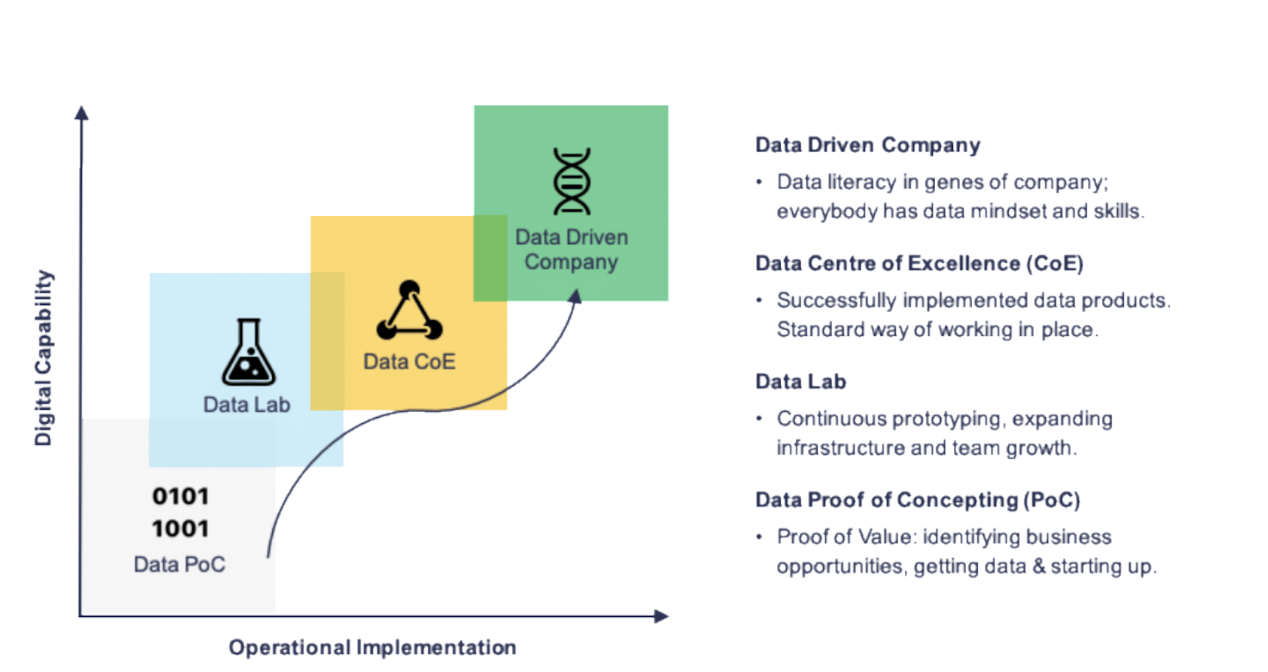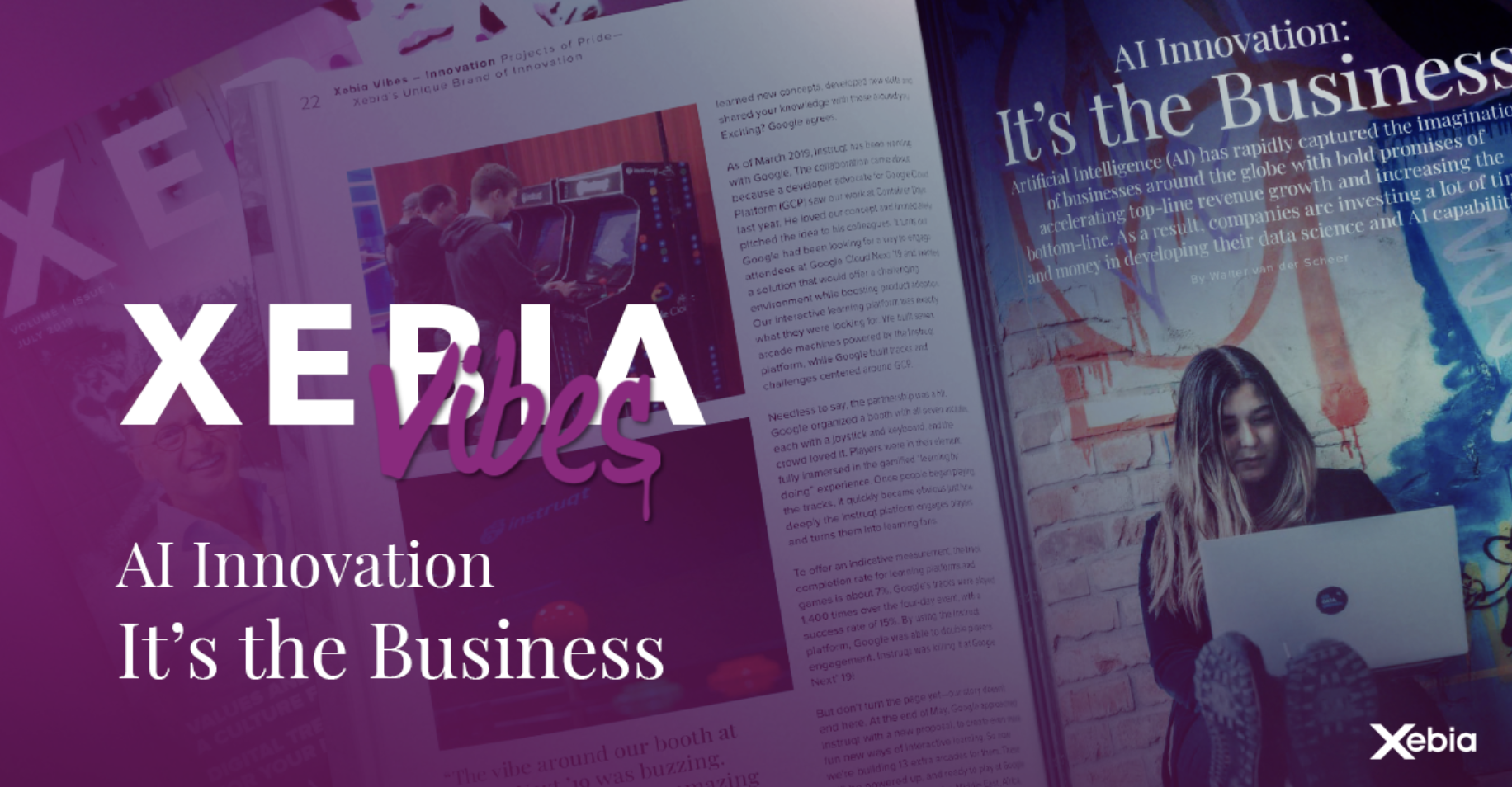Artificial Intelligence (AI) has rapidly captured the imagination of businesses around the globe with bold promises of accelerating top-line revenue growth and increasing the bottom-line. As a result, companies are investing a lot of time and money in developing their data science and AI capabilities.
For nearly ten years, GoDataDriven has been at the forefront of applied data innovation. What started with the implementation of Big Data infrastructures for IT, evolved in using AI to drive business value. Today, AI innovation goes far beyond data and technology. It’s all about business and tech working closely together to make a real impact. For GoDataDriven, taking care of the organizational side of innovation has become increasingly important.
GoDataDriven introduced GDD Biz to empower organizations on their journeys to success. GDD Biz consultants Stijn Tonk, Mark Schep, Henk Griffioen, and Steven Nooijen are on a mission to help organizations realize value from data and AI. In this article, they introduce themselves and their experiences with building AI-driven enterprises.
Organizing the AI-Driven Enterprise

GDD Biz consists of an interdisciplinary team of data experts with strong business acumen. “We all come from the data trenches and share the ambition to organize what we call ‘the AI-Driven Enterprise of tomorrow,’” explains Stijn Tonk, chief of strategy and innovation at GoDataDriven. “An AI-Driven enterprise can build better products and services by adopting new and disruptive data and AI technologies. As a data scientist, I have seen how AI can deliver value to all layers of an organization—from innovative services for customers to smart tools for employees. AI solutions can make a significant, positive impact. Within GDD Biz, I help organizations streamline their journey towards business value from AI.”
To underline the ambition of GDD Biz, GoDataDriven recently opened the doors of a shiny new office right next to the Utrecht central station. With offices in Amsterdam, Hilversum, and Utrecht, GoDataDriven now boasts a strong presence in central Netherlands. “It is our goal to build a strong community of data-minded people in Utrecht, just like we have done in Amsterdam,” says Stijn. “The first meetups and seminars have already been planned, and many will follow!“
Beyond Data and Technology
While working on data science projects at enterprises over the years, the GoDataDriven consultants learned something interesting about success with data and AI. Data and technology are important, but people, process, and organization are equally important. Data engineers and data scientists alone are not enough. Organizations need to bridge the gap between technological opportunity and business adoption, and this requires a new role—the analytics translator.
People: The Analytics Translator
When GoDataDriven started hiring analytics translators, they had to start from scratch. Because it was such a new role, no precise job profiles existed for it yet. So, the first step was to define its scope—a combination of product owner, business analyst, and AI specialist. Then GoDataDriven tapped in their existing professional network and discovered Mark Schep, a data scientist who had previously worked with GoDataDriven.
Mark Schep was working at ABN AMRO with a recently-formed analytics team in the customer experience department. There, he was involved in the development of apps like the bank's mobile app, Tikkie (a bill splitting app), and Grip (a money management app that categorizes your transactions). During each project, Mark experienced a positive difference when the business-side got involved. As he tells it, "Our mission was to reinvent our customer's experience using data. In reality, we gave data-driven advice to our stakeholders, with the goal of building data-driven products."
While Mark saw several fascinating data science-related experiments grow, quite a few never made it to production. "For projects to make it past the finish line, you need a clear AI-strategy, data science ambassadors and high-level sponsors in the organization, not to mention data-minded product owners."
When Stijn asked Mark to join GDD BIZ, he didn't hesitate. As Mark explains, "At GoDataDriven, I can fulfill my ambition to change data science within organizations from a technology push to a business pull."
Process: AI Solution Framework

Over the years, organizations have familiarized themselves with IT-processes and software delivery, but building AI-products is something different. As a lead data scientist at GoDataDriven, Henk Griffioen worked for customers like Quby, Tele2, and Heineken. Working on these projects, he found that moving through three distinct phases lead to success. "At GoDataDriven, we not only want to implement technical solutions, but we also want the organization to use our solutions. We want to establish sustainable change by involving the business from the beginning," explains Henk.
For his clients, Henk introduced a three-phase AI-solution framework based on methodologies like Design Thinking, Lean Startup, and Agile.
Ideation, the first phase, explores business problems and translates them into use cases. When building prototypes during the second phase, experimentation determines whether or not the business model is viable.
The industrialization phase takes a validated prototype and builds it into a scalable solution.
When it comes to building valuable AI solutions, adopting this framework sets your organization up for success. "There is a catch, however. You need to involve the business in every step of the process actively and put them in the driver's seat," Henk advises.
Organization: Maturity Levels

When organizations set out on a journey to become AI-driven, they often develop a practice for themselves. To them, it may seem that what they are doing is on the cutting-edge of innovation. In reality, often there have been others before them who have gone through the same maturity process. Steven Nooijen, a data science lead consultant at GoDataDriven, noticed that organizations struggle with these maturity topics. "We started a series of interviews to explore how a generic maturity model for Data & AI would look. The lessons learned along the way seem surprisingly generic across industries and domains," he said.
The goal of a maturity model is to help businesses understand their current competencies and to define a roadmap to improve them. The AI-maturity model is an excellent method for organizations to structure their progress towards becoming genuinely AI-driven. GoDataDriven distinguishes four maturity levels:
- Data Proof of Concepting
- Data Lab
- Data Center of Excellence
- Data-Driven Company

The maturity levels of an organization are based on seven main disciplines:
- Strategy and sponsorship
- Data management
- Technology management
- Governance, compliance, and security
- Talent strategy
- Organization structure
- Process, roles, and accountabilities
While discussing the maturity levels with enterprise leaders, Steven Nooijen says they noticed two major themes that seem critical to success: board level sponsorship and funding. "If no top-level executives sponsor AI initiatives, the business usually won't adopt the project. What's more, if there is value in these projects, their visibility in the organization is very limited," Steven explains. "This ties into the second major indicator for the maturity level of an organization—the source of funding. At AI-mature organizations, AI-products have proven their value, and we tend to see project funding coming from business units. More immature organizations have a higher dependency on central budgets from IT-departments and therefore struggle to scale their innovation beyond a couple of products."
From Ideation to Implementation
Ideation to implementation is a cyclical process that requires buy-in from the business at each phase—and someone to develop that buy-in, aka an analytics translator. Otherwise, who will bridge the gap between the business and the development teams? Who will organize ideation workshops and sessions, or scope ideas into clear project plans?
By combining lead data engineers, lead data scientists, and analytics translators into one team, GDD Biz can empower leading enterprises to become successful with data and AI.





